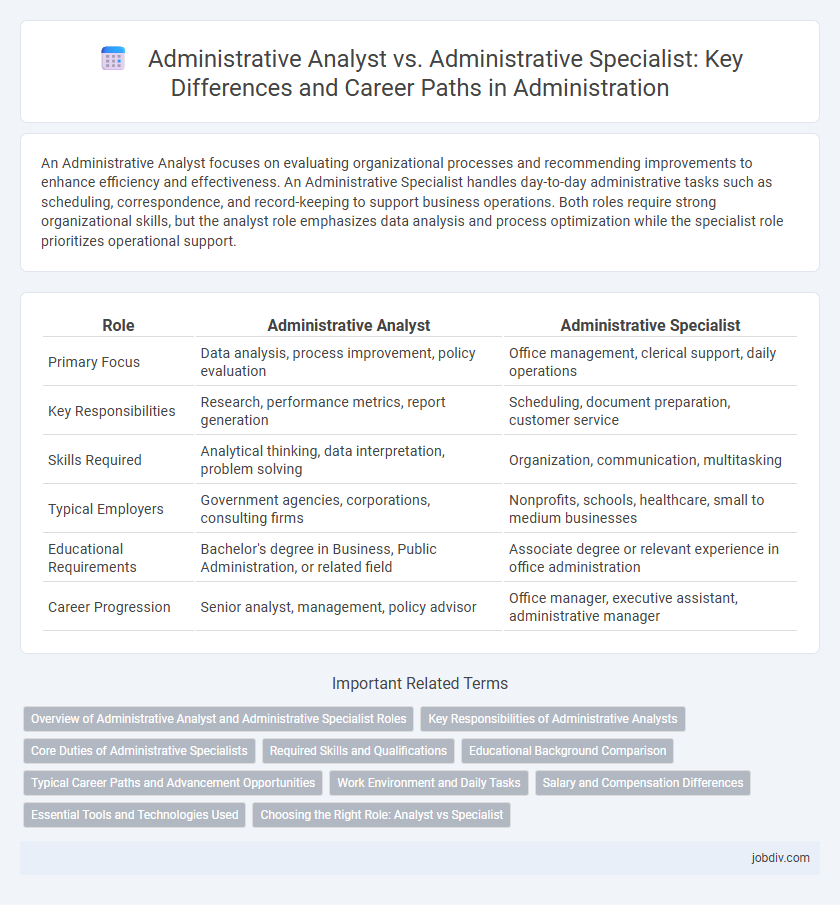An Administrative Analyst focuses on evaluating organizational processes and recommending improvements to enhance efficiency and effectiveness. An Administrative Specialist handles day-to-day administrative tasks such as scheduling, correspondence, and record-keeping to support business operations. Both roles require strong organizational skills, but the analyst role emphasizes data analysis and process optimization while the specialist role prioritizes operational support.
Table of Comparison
| Role | Administrative Analyst | Administrative Specialist |
|---|---|---|
| Primary Focus | Data analysis, process improvement, policy evaluation | Office management, clerical support, daily operations |
| Key Responsibilities | Research, performance metrics, report generation | Scheduling, document preparation, customer service |
| Skills Required | Analytical thinking, data interpretation, problem solving | Organization, communication, multitasking |
| Typical Employers | Government agencies, corporations, consulting firms | Nonprofits, schools, healthcare, small to medium businesses |
| Educational Requirements | Bachelor's degree in Business, Public Administration, or related field | Associate degree or relevant experience in office administration |
| Career Progression | Senior analyst, management, policy advisor | Office manager, executive assistant, administrative manager |
Overview of Administrative Analyst and Administrative Specialist Roles
Administrative Analysts evaluate and improve organizational processes by analyzing data, creating reports, and recommending strategic solutions to enhance efficiency and effectiveness. Administrative Specialists focus on managing day-to-day office operations, supporting executive functions, coordinating communication, and maintaining documentation to ensure smooth organizational workflow. Both roles require strong organizational skills, but analysts emphasize data-driven decision making while specialists concentrate on operational execution.
Key Responsibilities of Administrative Analysts
Administrative Analysts focus on evaluating and improving organizational systems by conducting detailed data analysis and process assessments. They develop and implement strategic recommendations to enhance efficiency and resource allocation within departments. Their role often includes preparing comprehensive reports and collaborating with management to support decision-making and policy development.
Core Duties of Administrative Specialists
Administrative Specialists primarily focus on managing office functions such as scheduling, record keeping, and maintaining communication channels within an organization. They handle specialized administrative tasks including data entry, preparing reports, and coordinating meetings to ensure smooth daily operations. Their role often involves supporting project management and facilitating interdepartmental collaboration to optimize organizational efficiency.
Required Skills and Qualifications
An Administrative Analyst requires strong analytical skills, proficiency in data interpretation, and expertise in project management software to optimize organizational processes. Essential qualifications include a bachelor's degree in business administration or related fields, advanced problem-solving abilities, and experience in performance metrics evaluation. In contrast, an Administrative Specialist focuses on organizational skills, communication proficiency, and familiarity with office management tools, typically needing a high school diploma or associate degree and expertise in scheduling, record keeping, and customer service.
Educational Background Comparison
Administrative Analysts typically possess a bachelor's degree in public administration, business, or a related field, often enhanced by coursework in data analysis and policy evaluation. Administrative Specialists commonly hold an associate's degree or certification in office administration, focusing on practical skills such as office management and customer service. The educational emphasis for Analysts centers on analytical and strategic competencies, while Specialists prioritize technical and operational expertise.
Typical Career Paths and Advancement Opportunities
Administrative Analysts often progress into senior analyst roles, project management, or operations management positions due to their focus on data analysis and process improvement. Administrative Specialists typically advance into specialized coordination roles, office management, or human resources support, leveraging their expertise in administrative tasks and organizational systems. Both career paths offer opportunities for leadership, with Analysts leaning towards strategic roles and Specialists focusing on operational efficiency.
Work Environment and Daily Tasks
Administrative Analysts typically work in office environments within government agencies or large corporations, focusing on data analysis, policy evaluation, and process improvement to enhance organizational efficiency. Administrative Specialists often operate in similar settings but engage more directly in clerical tasks, managing schedules, processing documents, and supporting daily administrative operations. Both roles require strong organizational skills, but Administrative Analysts emphasize strategic problem-solving, while Specialists prioritize routine administrative support.
Salary and Compensation Differences
Administrative Analysts typically earn higher salaries than Administrative Specialists due to their advanced analytical skills and responsibilities in assessing organizational processes. According to recent salary data, Administrative Analysts have a median annual salary ranging from $65,000 to $85,000, while Administrative Specialists generally earn between $45,000 and $60,000. Compensation packages for Analysts often include performance bonuses and professional development allowances, reflecting their strategic role in improving administrative efficiency.
Essential Tools and Technologies Used
Administrative Analysts primarily utilize data analysis software such as Microsoft Excel, Tableau, and SAP to evaluate organizational processes and improve efficiency. Administrative Specialists often rely on project management tools like Asana, Microsoft Office Suite, and CRM systems to support daily operational tasks and maintain workflow. Both roles require proficiency in communication platforms such as Microsoft Teams and email management systems to facilitate coordination and reporting.
Choosing the Right Role: Analyst vs Specialist
Selecting between an Administrative Analyst and an Administrative Specialist depends on organizational needs and skill sets. An Administrative Analyst focuses on evaluating and improving operational processes through data-driven insights and strategic planning, ideal for roles requiring problem-solving and efficiency optimization. Conversely, an Administrative Specialist excels in managing day-to-day office functions, coordinating schedules, and ensuring administrative support, making this role essential for maintaining smooth office operations.
Administrative Analyst vs Administrative Specialist Infographic

 jobdiv.com
jobdiv.com